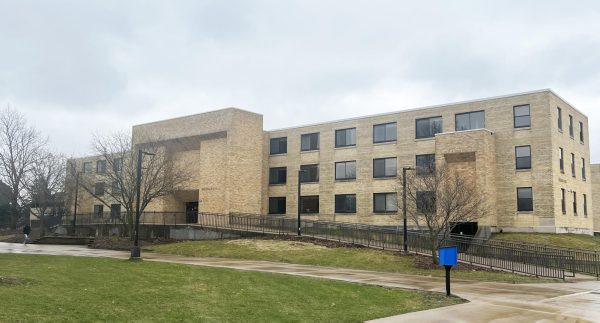UW-Platteville Hosts Rural Education Conference
Rurally Responsive Education Conference part of School of Education’s new focus
The School of Education hosted the Rurally Responsive Education Conference on April 12, featuring Dr. Sky Marietta as the keynote speaker. The event was sponsored by the Tommy G. Thompson Center for Public Leadership located at UW-Madison.
Dr. Marietta serves as an Assistant Professor at the University of the Cumberlands in Williamsburg, KY, and is the owner of Moonbow, a group of three coffee shops located in Corbin, Harlan and Williamsburg.
Dr. Marietta’s academic focus is rural education. Her recent book, Rural Education in America: What Works for Our Students, Teachers, and Communities, published in 2020, is a culmination of formal and informal experiences as a rural educator.
Dr. Marietta’s presentation featured her journey as she grew up in rural Kentucky, her travels around the country for education and for employment, including teaching at the Navajo Nation, and her eventual return to her home state.
She focused on how, at each school where she taught, she had to adapt her teaching style, lesson plans and approaches as part of a place-based education philosophy.
Her presentation urged attending school administrators to advocate for flexibility for place-based education, teachers to begin to consider how they may adapt their curriculum to be a more hearty, robust and engaging place-based classroom, and the education students need to continue their passion for teaching their communities.
The RREC, preceded on April 12 by a job fair for education students hosted by the School of Education, reflects a significant shift of focus in the School of Education as well as in Wisconsin.
Dr. Douglas Adams, Associate Professor of Education at UW- Platteville, spoke with the Exponent about the various changes that have occurred.
“The Department of Public UW-Platteville Instruction shifted. The licensing ran for three bands: early childhood, middle childhood, secondary,” Dr. Adams explained. “They collapsed those into one licensable program, which is kindergarten through 9th grade.”
Dr. Adams added, “We decided (this licensing change) would be a really good opportunity to do place-based education, infuse it with Act 31, and do education that is innovative and constructive. I think a lot of our students come from rural backgrounds and want to return to rural schools.”
Wisconsin Act 31, passed in 1989, is a state statute that requires school curriculum to “as part of the social studies curriculum, include instruction in the history, culture and tribal sovereignty of the federally recognized American Indian tribes and bands located in this state at least twice in the elementary grades and at least once in the high school grades,” per 121.02, WI Stats.
UW-Platteville is the pioneering school in the UW-System as well as the Driftless Region to emphasize a rural, place-based approach. As such, school administrators from Minnesota, Iowa and Illinois attended the RREC.
Ryan Ladd-Winders, President of Aspiring Educators on campus, spoke with the Exponent about how he thought the conference went.
“The day went really well, and the conference did, too.” Ladd- Winders said, “I think it was geared more towards school administrators and educators. We get so much exposure to place-based education already in our classes, but it’s still good to hear a good thing again, and it’s always good to hear another story.”
“I think having a conference for the administrators and in-service educators is great; market it to them and get us students involved to show them how we do place-based education and to give them examples of what to do and what we do,” Ladd-Winders concluded.














